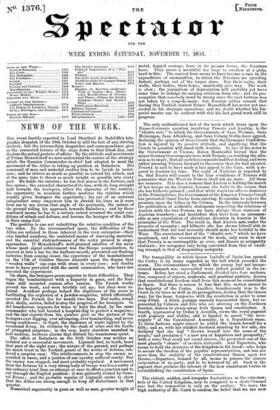NEWS OF THE WEEK.
THE event hastily reported in Lord Stratford de Redoliffe's tele- graphic despatch of the 28th October is still the last of any stirring interest; but the intermediate despatches and correspondence give us the connected history of the men down to that latest day, and disclose the actual posture of affairs. siege the attitude and movements of Prince Menschikoff we now understand the nature of the strategy which the Russian Commander-in-chief had adopted to meet the movement of the Allies in taking up position at Balaclava. His command of men and material enables him to be lavish in resist- ance; and he strives as much as possible to extend his attack, and at the same time to throw as much weight as possible into every part. He holds the interior; he has free access to the fortress, and free egress • the extended characterof its line, with its long straight wall towards the besiegers, alters the character of the contest; his superiority in numbers further modifies the relation which usually gives besiegers the superiority ; his use of an external independent army empowers him to stretch his lines as it were from sea to sea across that angle of the peninsula, the nature of the ground aiding his approach towards Balaclava ; and by these combined means he has to a certain extent reversed the usual con- ditions of attack and defence, and become the besieger of the Allies in their camp-fort. The position is one not unbefitting the relative condition of the two sides. By the circumscribed space, the difficulties of the Allies are reduced to those inherent in the very enterprise—their own limited numbers, the restricted means of conveying material, and the essential obstructiveness of the rocky ground to siege- approaches. If Menschikoff's well-planned sacrifice of the navy whose most signal achievement was the Sinope assassination, to convert it into a bar for the harbour-mouth, prevented our floating batteries from coming closer' the experience of the bombardment on the 17th of October throws discredit upon the dogma that "wooden walls" can Cope with stone in every ease; and doubts seem to have prevailed with the naval commanders, who have not repeated the experiment.
On shore, the besiegers prove superior to their difficulties. They began the bombardment with a disparity in guns, and the Rus- sians still mounted cannon after cannon. The French works proved too weak, and were terribly cut up; but they were re- paired. Accident perhaps helped the slightness of the cover in facilitating the explosion: of a powder-magazine, which effeoteally arrested the French fire for nearly two days. But rocks, round shot, shells, sorties, failed to stop the progress of the besiegers. So did treacherous requests for truce to bury the dead, by the same commander who had hoisted a hospital-flag to protect a magazine ; and the last reports from the quarter giVe us the picture of the besiegers ever digging, ever advancing, ever bombarding, and never losing confidence; in front, the blackness of night lighted by the occasional firing, its stillness by the clash of arms and the bustle of attempted surprises; in the rear, hasty slumbers snatched in half undress, `between alarms that disturb the treacherous quiet.
The affair at Balaclava on the 25th October wee neither an isolated nor a suoceeeful movement. Liprandi had, in truth, beset that part of the right rear ; the tature of the ground, and perhaps too much trust in the Turkish guard of the works of defence, ren- dered a surprise easy. The reinforcements to stop the enemy as- sembled in haste, andel portion of our cavalry suffered sorely. But the enemy was stopped, and most probably repulsed. A movement from the fortress by a very Strong body of troops was less a sortie of the ordinary kind than an attempt at once to effect a junction and-to out through the English positicei: it was gallantly routed by Gene- ral Evans ; and the probable repulse of Liprandi seems to show that the Allies are strong enough to keep off disturbance in that quarter.
Numerical superiority in guns as well as men, greater weight of
metal, dogged courage, force in its grosser forms, the Russians have. They prove a mouthful too large to swallow at a gulp, hard to bite. The contest here seems to have become a race in the expenditure of ammunition, in which the Russians are spending fastest, perhaps out of the larger store. But their rocks, their walls, their bodies, their hopes, manifestly give way. The work is slow ; the journalism of depreciation will probably yet have some time to indulge its carping criticism from afar, and its pre- sumption that somebody must be wrong since the vast fortress was not taken by a coup-dc-main: but Russian critics remark that during this Turkish contest Prince Menschikoff has never yet sue- (veiled in his strategic operations, and we doubt whether his Im- perial master can be content with this his last grand work still in progress.


























